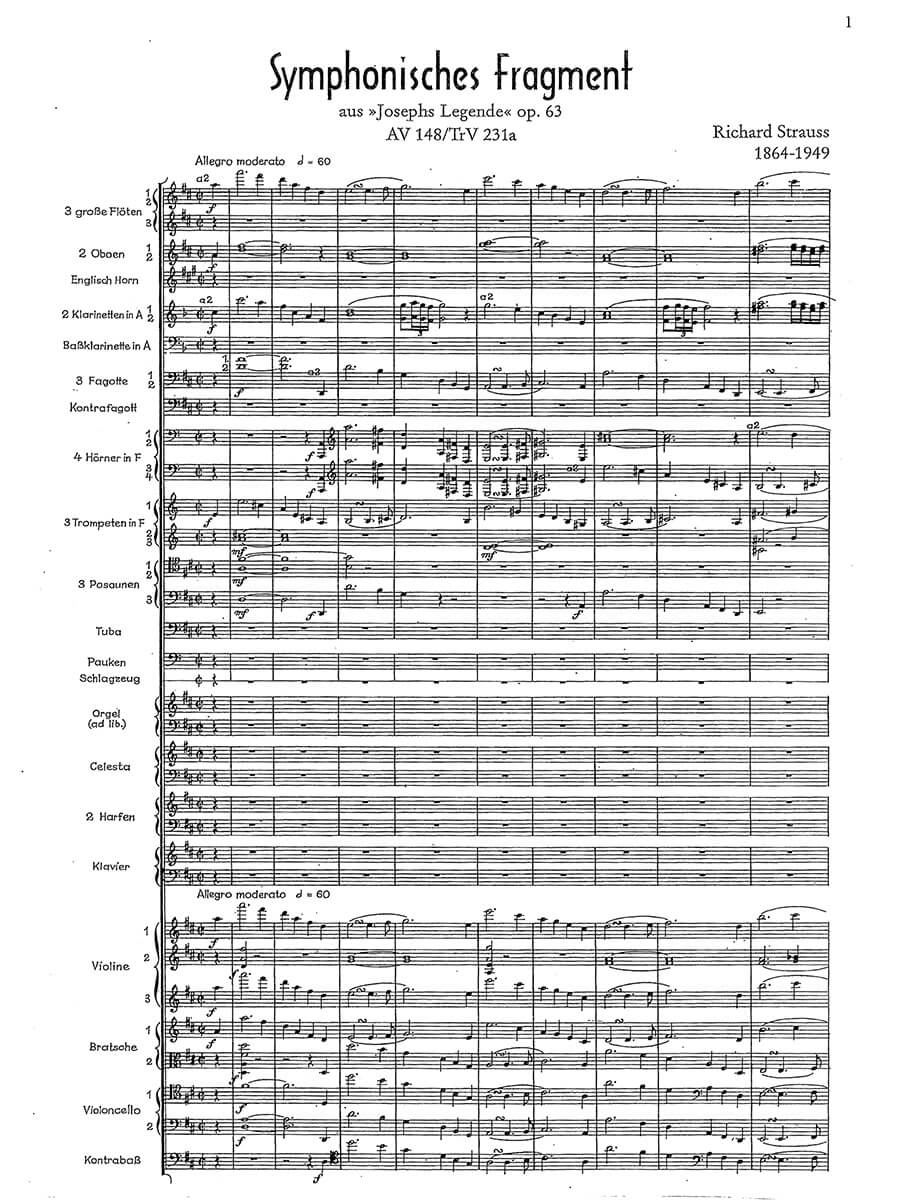Symphonic Fragment from Joseph’s Legend, Op. 63
Strauss, Richard
30,00 €
Preface
Richard Georg Strauss – Symphonisches Fragment aus Josephs-Legende
(b. Munich, 11 June 1864 – d. Garmisch-Partenkirchen, 8 September 1949)
AV148/TrV 231a (1948-49)
Symphonic Fragment from Josephs Legend, AV148/TrV 231a (1948-49)
Composed:
June 1912 – 2 February 1914 (Berlin) as La Légende de Joseph
Premiere:
14 May 1914, full ballet performed by the Ballets Russes, at the Théâtre National de l’Opéra in Paris (seven performances); London premiere 23 June 1914. The composer conducted. Due to the looming war, Strauss was never paid his 6,000-franc fee.
Publication:
Mainz: Fürstner Musikverlag, 1914, plate 8495. Also published in Berlin: Adolf Fürstner, 1914, one copy of this edition in New York’s Morgan Library
First performance of Symphonisches Fragment (1948):
26 February 1949 by the San Antonio Symphony, conducted by Max Reiter, March 1949 by the Cincinnati Symphony, conducted by Max Reiter
Orchestration:
3 flutes, 2 oboes, English horn, 2 clarinets in A, bass clarinet in A, 2 bassoons, contrabassoon, 4 horns in F, 3 trumpets in F, 3 trombones, tuba, timpani, triangle, tambourine, bass drum, organ (ad lib.), celeste, 2 harps, piano, strings (violins split into 3)
Composer
Richard Strauss’s father Franz Strauss (1822-1905) was the Principal Horn for the Bavarian Court Opera orchestra in Munich (playing with them from 1847-89). He greatly disliked the modern music of Wagner and shielded his pre-teen son from the vulgar emotionalism of Wagnerian opera. Against his father’s wishes, the teenaged Strauss attended performances of Wagner’s Tannhäuser, Siegfried, and Lohengrin, and devoured the score of Tristan. By the age of 21, Strauss was a sensation across Germany; this was also the year of his first conducting appointment at Meiningen; he became one of the most celebrated conductors of all time, making guest appearances around the world. Also, during this time, Strauss began to read the writings of Wagner and Schopenhauer. Of particular interest was the concept of “Zukunftsmusik” or “music of the future”. Strauss believed that “new ideas must search for new forms.” Strauss found success on the operatic stage with Salome, Elektra, and Der Rosenkavalier. His works became so popular that special trains would run into Dresden just so the public could see his production. His opera career came to halt when war was declared in 1914. …
read more / weiterlesen … > HERE
Score Data
| Edition | Repertoire Explorer |
|---|---|
| Score Number | 4857 |
| Genre | Orchestra |
| Pages | 108 |
| Size | 210 x 297 mm |
| Printing | Reprint |
